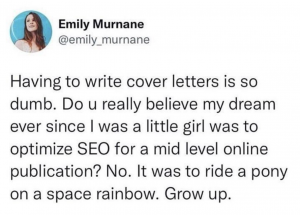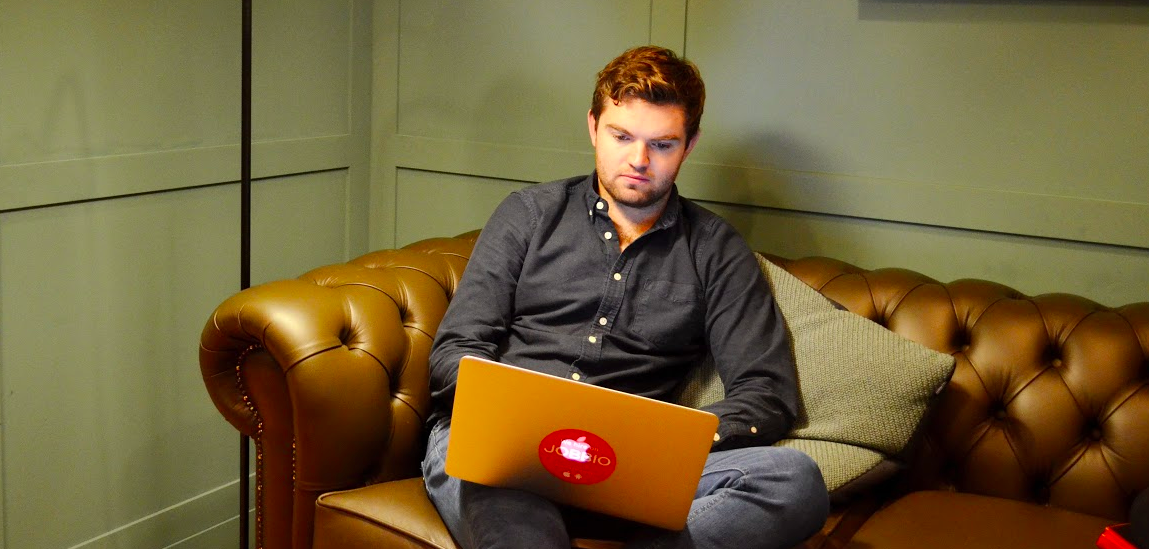The days of selecting the perfect textured linen paper for printing your cover letter are long gone, but even its email replacement is dwindling in popularity.
Are cover letters still relevant in 2024? Let’s take a closer look.
Diminished relevance
Writing a cover letter simping over how much you want to work for a particular company is nobody’s idea of fun. Writer, director, producer, and editor Emily Murnane sums it up perfectly.
So it’s very tempting to write them off completely.
Many argue that it’s an outdated formality, overshadowed by the efficiency and convenience of online applications. Some recruiters admit to not even reading cover letters, focusing solely on CVs and online profiles to evaluate candidates.
Cover letter relevance is usually role and industry-dependent.
For example, tech startups may prioritise skills-based coding challenges and portfolio reviews over traditional applications for developers, but for customer success, marketing, sales and leadership roles, a well-written cover letter can tell you a lot about a candidate.
Similarly, in industries such as law, finance, hospitality and academia, formal cover letters are often much-valued.
However, more and more, hiring managers are relying on Applicant Tracking Systems (ATS) to scan influxes of applications, and it is easier from an admin point of view if just one document is being scanned. This means cover letters can be bypassed in the ATS process, but not always.
While it’s true that many job applications go through a company-branded portal, and require candidates to spend time filling out open text box fields (another painful task), instead of emailing in. It’s also true that one of these required actions is usually uploading a CV, and sometimes a cover letter.
For this, you’re usually given the option to attach, link to Dropbox, Google Drive, or to enter text manually, and a broad range of file types like pdf, doc, docx, txt and rtf are also accepted.
Clearly some companies are still keen on reading, or at least scanning, those cover letters.
Ultimately, if a job ad specifies a cover letter and you don’t include one, your application may go straight to the ignore pile for not following directions.
The case for cover letters
 While some hiring managers disregard cover letters, others do read them.
While some hiring managers disregard cover letters, others do read them.
Sometimes your CV may not match perfectly with the ideal candidate they are searching for, but your cover letter can show how your qualifications, experience and career transitions could actually be very relevant, and that you are in fact exactly what they are looking for.
It’s also a chance to show how your values align with the organisation, and demonstrate your enthusiasm for facing industry challenges in a way that’s not cringe-worthy. All this tells those hiring that you are willing to go above minimum requirements, and that you’re already invested in the company’s mission.
Thankfully, in the age of ChatGPT, it’s never been easier to draft a cover letter, so why not prompt for a template specific to your experience and industry, and tweak this per job application? It may go to trash, but it could also be the very thing that helps you stand out from the crowd.
Think of it like this. A CV outlines your skills, experience and qualifications. A cover letter spells out how you are the ideal fit for this particular job. Taking 15 minutes to tweak a template might be the smartest way to spend your next tea break.
Want more like this?
If you enjoyed what you’ve read above, and would like to get original work-related content on your own website, plus the chance to maximise your revenue, contact us now.












